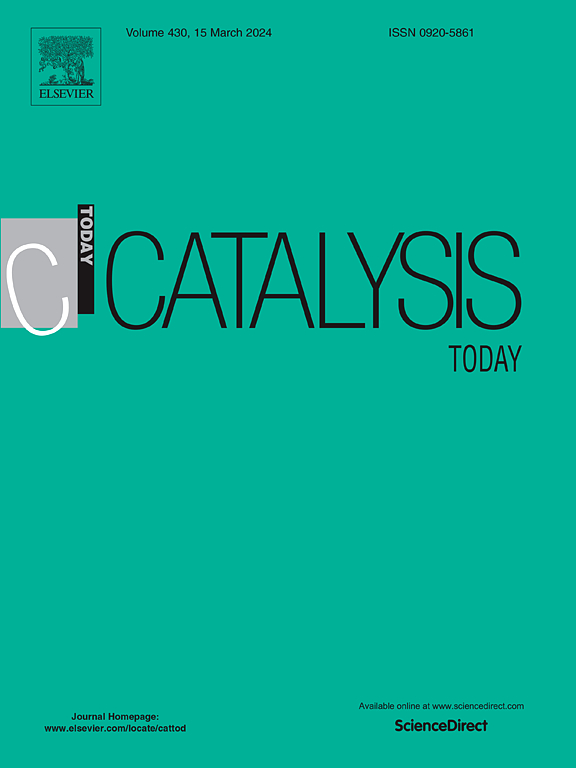CO2 facilitated aromatization of butenes to benzene, toluene and xylene
IF 5.2
2区 化学
Q1 CHEMISTRY, APPLIED
引用次数: 0
Abstract
The aromatization of mixed C4 olefins is an important way to convert low value industrial C4 hydrocarbons by-products into value-added chemicals. Herein, we report CO2 facilitated aromatization of C4 olefins to benzene, toluene and xylene (BTX) using metal oxide-zeolite (OXZEO) bifunctional catalysts. An aromatics selectivity of 80.0 % at a CO2 conversion 10.5 % and butene conversion ∼100 % has been obtained at 500 °C and 1.0 MPa. The proportion of BTX in aromatics reaches as high as 91.0 %. Detailed characterization reveals that the Brønsted acid sites of ZSM-5 are the active sites for aromatization, while the presence of ZnCrAlOx oxides provides adsorption sites for CO2 and further reaction with the hydrogen species generated during aromatization. The presence of CO2 not only enhances the selectivity of aromatics, but also improves the stability of the reaction. 13C isotope experiments demonstrate that CO2 participates in the formation of aromatics. Furthermore, this new strategy is applicable for utilization of different sources of mixed C4 olefins and C4-C5 olefins, in addition to the benefits of utilizing CO2 towards a sustainable decarbonized society.
二氧化碳促进丁烯芳构化成苯、甲苯和二甲苯
混合C4烯烃的芳构化反应是将低价值工业C4烃副产品转化为高附加值化学品的重要途径。在此,我们报道了二氧化碳促进C4烯烃芳构化为苯,甲苯和二甲苯(BTX)使用金属氧化物-沸石(OXZEO)双功能催化剂。在500℃和1.0 MPa条件下,CO2转化率为10.5% %,丁烯转化率为~ 100 %,芳烃选择性为80.0 %。BTX在芳烃中的比例高达91.0 %。详细表征表明,ZSM-5的Brønsted酸位是芳构化的活性位点,而ZnCrAlOx氧化物的存在为CO2提供了吸附位点,并与芳构化过程中产生的氢进一步反应。CO2的存在不仅提高了芳烃的选择性,而且提高了反应的稳定性。13C同位素实验表明CO2参与了芳烃的生成。此外,这种新策略适用于利用不同来源的混合C4烯烃和C4- c5烯烃,以及利用二氧化碳实现可持续脱碳社会的好处。
本文章由计算机程序翻译,如有差异,请以英文原文为准。
求助全文
约1分钟内获得全文
求助全文
来源期刊

Catalysis Today
化学-工程:化工
CiteScore
11.50
自引率
3.80%
发文量
573
审稿时长
2.9 months
期刊介绍:
Catalysis Today focuses on the rapid publication of original invited papers devoted to currently important topics in catalysis and related subjects. The journal only publishes special issues (Proposing a Catalysis Today Special Issue), each of which is supervised by Guest Editors who recruit individual papers and oversee the peer review process. Catalysis Today offers researchers in the field of catalysis in-depth overviews of topical issues.
Both fundamental and applied aspects of catalysis are covered. Subjects such as catalysis of immobilized organometallic and biocatalytic systems are welcome. Subjects related to catalysis such as experimental techniques, adsorption, process technology, synthesis, in situ characterization, computational, theoretical modeling, imaging and others are included if there is a clear relationship to catalysis.
 求助内容:
求助内容: 应助结果提醒方式:
应助结果提醒方式:


